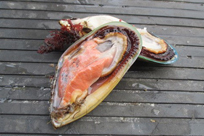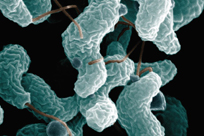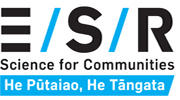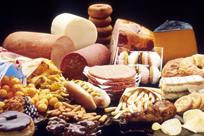ESR provides a comprehensive suite of food testing services for consumers, manufacturers and exporters. Our expertise spans bacterial, viral, chemical, physical and radiological hazards in food and can identify exactly what is in your food. With over 300 professional science staff, ESR’s strength lies in the depth and breadth of our scientific knowledge across microbiology, chemistry and risk analysis.
ESR has IANZ accreditation for “instrumental” and “non-instrumental” techniques for the rare and unusual test that your business may require. This allows us to deliver accredited reports for non-standard analysis. With access to a broad range of International Gold Standard tests, we find out how, where and when food contamination happened as well as identifying the type of contaminant in food and its source. Our Green Channel™ food testing services provide New Zealand food exporters into China with assurance that their products meet the quality and safety requirements of the Chinese authorities.
We see the rare and unusual every day and our expertise in food safety and security combined with our overlap between clean water and public health operations means we can help you rapidly identify and manage any threat.
Genome sequencing can detect the presence of an unwanted microorganism in food, health, water and environment. ESR’s scientists will ensure the best possible results by providing information to identify issues in a food chain or processing plant. GenomESR can accurately identify the microorganism and also compare the genome sequence of the microorganism with similar microorganisms of interest, to identify and characterise isolates (microorganisms) from samples. Read more about GenomESR [PDF, 4.5 MB] and talk to us about this service.
Find out more about how we help in specific sectors:
Dairy
- Norovirus, adenovirus, rotavirus and other enteric virus identification [PDF, 2.3 MB]
- “Radiation free” export certification
- Aflatoxin, ochratoxin, and other mycotoxins identification and confirmation
- Cyanuric acid and melamine analysis – a unique analysis when not in milk powder, e.g. packaging
- Salmonella identification and confirmation
- Rapid Campylobacter analysis
- Identification of milk proteins in “non-milk” products
- Assessing the environmental impact of milk suppliers farm run-off, for example does the run-off contain faecal material from a broken septic tank, or is it from a flock of ducks?
Horticulture
- Norovirus, adenovirus, rotavirus and other enteric virus identification [PDF, 2.3 MB]
- “Radiation free” export certification
- Aflatoxin, ochratoxin, and other mycotoxins identification and confirmation
- Cyanuric acid and melamine analysis – a unique analysis when not in milk powder, e.g. packaging
- Salmonella identification and confirmation
- Rapid Campylobacter analysis
- Olive oil quality and provenance
- Assessing the environmental impact of horticulture run-off, for example does the run-off contain faecal material from a broken septic tank, or is it from a flock of ducks?
Meat
- Norovirus, adenovirus, rotavirus and other enteric virus identification [PDF, 2.3 MB]
- “Radiation free” export certification
- Aflatoxin, ochratoxin, and other mycotoxins identification and confirmation
- Cyanuric acid and melamine analysis – a unique analysis when not in milk powder, e.g. packaging
- Salmonella identification and confirmation
- Salmonella identification and confirmation
- Rapid Campylobacter analysis
- Omega-3 and other "good" fatty acid profiling
- Assessing the environmental impact of meat suppliers farm run-off, for example does the run-off contain faecal material from a broken septic tank, or is it from a flock of ducks?
Read the full list of food safety and food quality testing that ESR does[PDF, 111 KB](external link)
Submit a sample using an ESR test request form(external link).
STEC testing for the meat industry
ESR’s role in the meat export market is critical in assisting with the clearance of meat exported to international markets.
Our Enteric Reference Laboratory is uniquely (and solely) positioned in New Zealand to undertake the international reference level confirmation and characterisation for the pathogenic group known as the "Top 7" E. coli groups, at standards that are demanded by the United States and other countries.
Most E. coli are harmless and are actually an important part of a healthy human intestinal tract. However some E. coli are harmful. The Shiga toxin-producing E. coli (STEC) cause disease by producing a toxin, the most common serotype being E. coli O157. This was classified as an adulterant in beef products under US Federal Meat Inspection Act. Six additional STEC serotypes were then prohibited and are referred to as the "Top 6" (i.e. O26, O45, O103, O111, O121, and O145), creating a “Top 7” group of adulterants.
ESR can carry out the confirmatory testing that categorically shows whether the meat is “safe” or not. To submit samples for O157, Super 6 & 7 testing, please use the Single specimen request for Meat Enrichment broth [PDF, 586 KB] and follow the guidelines below:
- The following vials from Thermo Fisher Scientific are strongly recommended to avoid samples leaking and to ensure the safety of staff handling the samples: 30 ml PC (Poly-carbonate) flat base, Natural screw cap, cat# LBS3688.
- Please make sure that the samples are clearly labelled and if necessary seal the lid with parafilm (not sellotape).
- We require a minimum of 10 ml for Super 6/7 testing.
- If leaking vials are delivered to ESR, we will NOT be able to process them, as this exposes our staff to an unacceptable health and safety risk.
During the Bobby calf season weekly testing reports for clients are published on this secure site(external link).
Please email us for access or for any questions on STEC confirmation testing.
Or for general information - food.safety@esr.cri.nz

Safe New Zealand Seafood programme
The goal of this programme is to ensure that NZ seafood is safe to consume.

Investigating the causes of diarrhoeal illness
Every year 2.4 billion cases of diarrhoeal illness occur globally

